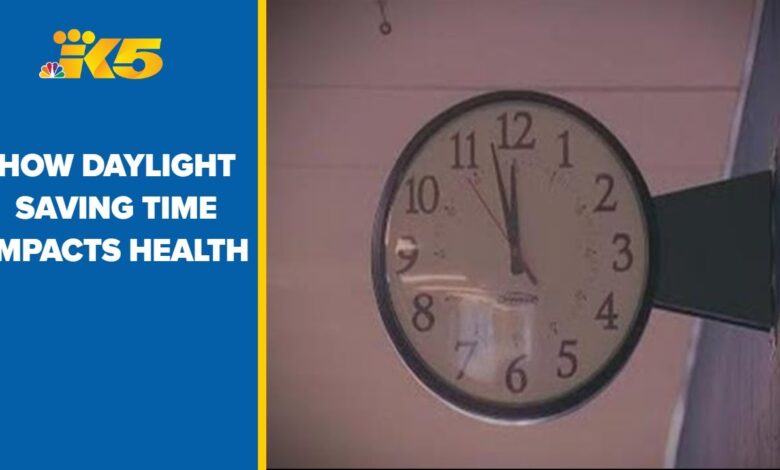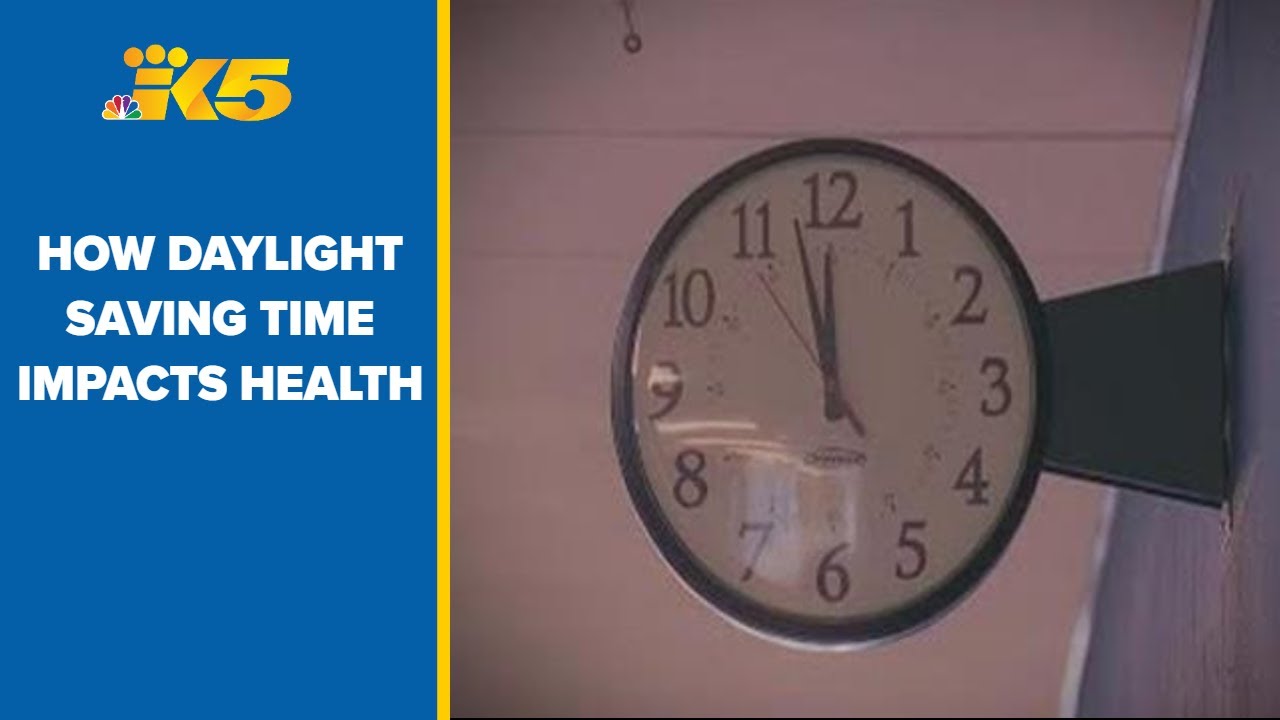
Why you feel out of sorts after daylight saving time is a common experience. This shift in our sleep schedule throws our bodies and minds into a temporary state of disarray, impacting everything from our mood to our energy levels. We’ll explore the science behind these feelings, the effects on sleep, mood, and physical well-being, and finally, provide some helpful strategies to minimize the impact.
Daylight Saving Time (DST) is a periodic adjustment to our clocks, moving them forward or backward. This seemingly simple change can disrupt the intricate balance of our internal clocks, leading to a range of unpleasant experiences. The impact is felt differently by each individual, depending on various factors including age, lifestyle, and underlying health conditions.
Circadian Rhythm Disruption
The annual ritual of daylight saving time (DST) often leaves many feeling disoriented and out of sync. This temporary shift in our sleep-wake cycle can disrupt our natural internal clock, the circadian rhythm, leading to a cascade of physical and mental consequences. The effect is particularly noticeable in the weeks following the time change, as the body struggles to readjust.The human circadian rhythm is a natural, internal process that regulates our sleep-wake cycle, body temperature, hormone release, and other bodily functions over a roughly 24-hour cycle.
Crucially, this rhythm is synchronized with the natural light-dark cycle of the environment. Shifting the clock forward or backward disrupts this synchronization, leading to a mismatch between our internal clock and the external world.
Impact on Sleep Patterns
The typical sleep patterns before and after daylight saving time exhibit significant differences. Before the time change, individuals generally fall asleep and wake up at times that align with their natural sleep-wake cycle, creating a consistent rhythm. After the time change, the body is forced to adapt to a new schedule that often involves waking up earlier or going to bed later than previously.
This mismatch can lead to a noticeable decrease in sleep quality and duration.
Physiological Mechanisms of Disruption
Several physiological mechanisms contribute to the disruption caused by daylight saving time. The primary mechanism involves the impact of light exposure on the body’s internal clock, which is controlled by the suprachiasmatic nucleus (SCN) in the brain. The SCN receives information about light levels from the eyes and uses this information to regulate the production of melatonin, a hormone that promotes sleep.
Impact of Light Exposure
Light exposure is a crucial factor in regulating the circadian rhythm. When light levels decrease, the body’s production of melatonin increases, signaling the body that it’s time to sleep. Conversely, increased light exposure inhibits melatonin production, signaling wakefulness. The abrupt shift in light-dark cycles during daylight saving time disrupts this delicate balance. This can manifest as difficulty falling asleep, staying asleep, or experiencing poor sleep quality.
The body struggles to adjust to the new light-dark schedule, leading to a disruption in the natural sleep-wake cycle.
Factors Influencing Sleep Quality and Consistency
| Factor | Description | Impact on Sleep |
|---|---|---|
| Light Exposure | The amount and timing of light exposure significantly affect melatonin production and the body’s internal clock. Exposure to bright light in the evening can suppress melatonin production, delaying sleep onset. | Reduced sleep quality and difficulty falling asleep. |
| Melatonin Production | Melatonin, a hormone secreted primarily at night, is crucial for regulating sleep. Disruptions to the timing of melatonin secretion, often caused by light exposure, can lead to sleep problems. | Disrupted sleep-wake cycle, impacting sleep duration and quality. |
| Sleep Schedule | Maintaining a consistent sleep schedule is essential for a healthy circadian rhythm. The abrupt change in sleep schedule due to daylight saving time can cause a mismatch between the internal clock and the external environment. | Difficulty adjusting to the new schedule, resulting in poor sleep quality and duration. |
| Daily Activities | Daily activities, including exercise, meal times, and social interactions, can influence the sleep-wake cycle. Inconsistencies in these activities can disrupt the natural rhythm and affect sleep quality. | Irregular sleep patterns, affecting both sleep onset and duration. |
Sleep Deprivation and Its Consequences

The shift in our sleep schedule due to daylight saving time often leads to a disruption in our natural sleep-wake cycle, impacting our overall well-being. This disruption can manifest in various ways, particularly in the form of sleep deprivation. Understanding the connection between reduced sleep and its effects on our bodies and minds is crucial for navigating the aftermath of the time change.The time change, moving clocks forward or backward, forces us to adjust our sleep schedule, often resulting in a shorter duration of sleep.
That feeling of being utterly off after daylight saving time? It’s more than just a weird sleep schedule. It’s also linked to the types of diets that contribute to a higher risk of heart disease. For example, a diet high in processed foods, sugary drinks, and unhealthy fats can wreak havoc on your body, much like the disruption of your sleep schedule.
Knowing more about the diets associated with increased risk of heart disease can help you understand the connection to that unsettling feeling of being out of sorts. So, the next time you’re struggling to adjust, remember that your body’s internal clock is more sensitive than you think.
This change can be particularly problematic for individuals who already struggle with sleep or whose schedules don’t allow for adjusting to the new time easily. This reduced sleep time can have a cascading effect on our daily lives, impacting our mood, cognitive function, and even our physical health.
The Link Between Time Change and Reduced Sleep Duration
The abrupt shift in the clock’s position disrupts our natural sleep-wake cycle, making it difficult to fall asleep at the desired time. This disruption is often compounded by the social and environmental factors that accompany the time change. Many individuals experience difficulty adjusting their sleep schedule, which results in reduced sleep duration.
Potential Consequences of Sleep Deprivation on Mood and Cognitive Function
Sleep deprivation can significantly impact our mood, making us irritable, anxious, and prone to mood swings. The lack of sufficient sleep also negatively affects our cognitive function, impacting our ability to concentrate, make decisions, and remember information. This can manifest in difficulties with problem-solving and impaired judgment. Studies have shown a clear correlation between sleep deprivation and a decline in performance on tasks requiring attention and memory.
That feeling of being completely off after daylight saving time? It’s not just a weird quirk of the human body; it’s a real shift in our internal clocks. Our bodies are trying to adjust to the new sleep schedule, leading to fatigue and general disorientation. While the connection might seem tenuous, similar disruptions to our internal rhythms can occur in cases of more serious health issues.
For example, it’s crucial to understand if underlying conditions like leukemia might also be affecting your sleep patterns or if you’re experiencing a more concerning health issue, such as a stroke. Finding out if can leukemia cause a stroke is important to properly diagnose the cause of any persistent sleep disruptions. In the end, understanding the root of that “off” feeling after daylight saving time is key to regaining your usual energy and well-being.
How Lack of Sleep Affects Alertness and Focus
Sleep deprivation significantly impairs our alertness and focus. Reduced sleep leads to a decreased ability to maintain concentration, impacting our productivity and efficiency. This diminished alertness is a significant risk factor in situations requiring sustained attention, such as driving or operating machinery. The brain’s ability to process information and react appropriately is significantly compromised with inadequate sleep.
The Connection Between Sleep Deprivation and Increased Risk of Accidents
The impact of sleep deprivation on alertness and reaction time directly correlates with an increased risk of accidents. When individuals are sleep-deprived, their reaction time slows, making them more susceptible to errors and accidents, particularly in tasks requiring quick responses. This is especially dangerous in situations like driving, where even small delays in reaction time can have severe consequences.
A recent study highlighted the connection between sleep deprivation and a significant increase in traffic accidents during the period following daylight saving time.
Symptoms of Sleep Deprivation: Mild, Moderate, and Severe
| Severity | Symptoms | Impact |
|---|---|---|
| Mild | Difficulty concentrating, feeling irritable, slight mood swings, occasional lapses in alertness. | Reduced productivity, minor relationship stress, potential for errors in tasks requiring attention. |
| Moderate | Persistent difficulty concentrating, increased irritability and mood swings, noticeable lapses in alertness, difficulty with decision-making. | Significant decrease in productivity, strained relationships, potential for accidents in high-risk situations. |
| Severe | Inability to concentrate, extreme irritability and mood swings, frequent lapses in alertness, significant difficulty with decision-making, hallucinations or delusions, disorientation. | High risk of accidents and errors, significant impact on daily functioning, potentially life-threatening situations. |
Emotional and Mental Impacts: Why You Feel Out Of Sorts After Daylight Saving Time
The shift in our internal clocks caused by daylight saving time isn’t just about sleep; it significantly impacts our emotional and mental well-being. The disruption to our circadian rhythm, as we’ve already explored, leads to a cascade of effects that can manifest as mood swings, increased stress, and even exacerbate existing mental health conditions. Understanding these emotional and mental impacts is crucial for navigating this annual time adjustment and taking proactive steps to mitigate its negative consequences.
Potential Emotional Effects of the Time Change
The disruption to our sleep patterns brought on by daylight saving time can trigger a range of emotional responses. These reactions vary from person to person and are influenced by various factors, including pre-existing mental health conditions, individual sensitivity to change, and lifestyle.
| Emotional Response | Description |
|---|---|
| Mood Swings | Significant fluctuations in mood, from irritability and frustration to sadness and anxiety. |
| Increased Anxiety | Heightened feelings of worry, fear, and unease, often stemming from the sleep disruption and resulting fatigue. |
| Irritability | A heightened tendency towards frustration and impatience, often amplified by the lack of adequate sleep. |
| Depression | In individuals already prone to depression, the time change can exacerbate symptoms, making feelings of sadness, hopelessness, and loss more pronounced. |
| Reduced Focus and Concentration | Difficulty in maintaining attention and concentration, impacting productivity and overall cognitive function. |
| Decreased Motivation | A diminished drive and enthusiasm, often linked to the fatigue and emotional distress associated with the sleep disruption. |
Connection Between Sleep Disruption and Mood Swings
Sleep deprivation directly correlates with mood swings. A lack of sufficient sleep disrupts the delicate balance of neurotransmitters in the brain, which are responsible for regulating mood. When sleep is compromised, the levels of serotonin and dopamine, crucial for emotional stability, can fluctuate, leading to increased irritability, anxiety, and even feelings of sadness. This connection highlights the importance of prioritizing sleep to maintain emotional well-being.
Impact on Stress Levels
The time change can significantly affect stress levels. The disruption to the circadian rhythm, resulting in sleep deprivation, leads to a physiological response that resembles the body’s reaction to stress. This can manifest as increased cortisol levels, impacting the body’s ability to cope with daily stressors. The resulting fatigue and irritability further contribute to a heightened stress response.
Emotional Responses Across Demographics
Emotional responses to the time change differ across demographics. For example, younger adults may experience more pronounced mood swings and irritability due to the disruption in their social schedules and academic or professional demands. Older adults may be more susceptible to depression and cognitive decline due to the impact on their sleep patterns and pre-existing health conditions. Children may exhibit increased behavioral problems, and individuals with pre-existing mental health conditions may see a worsening of their symptoms.
That groggy feeling after daylight saving time? It’s more than just a temporary sleep disruption. You might be wondering about the connection to your overall health, including your kidney function. Perhaps you’ve been pondering some kidney health doctor questions lately? If you’re curious about how those shifts in our sleep-wake cycles could affect your kidneys, checking out some resources on kidney health doctor questions might be a good starting point.
Ultimately, it’s the disruption to your body’s natural rhythm that leads to those sluggish days after the clock change.
Understanding these demographic differences is essential in tailoring strategies for mitigating the negative impacts of daylight saving time.
Potential Mental Health Issues Exacerbated
The sleep disruption caused by daylight saving time can exacerbate existing mental health issues. Individuals with pre-existing conditions such as anxiety disorders, depression, or bipolar disorder may experience a worsening of symptoms. The disruption in sleep patterns can trigger or intensify episodes of mania or depression in individuals with bipolar disorder. Similarly, those with anxiety disorders may experience heightened anxiety and panic attacks.
These individuals require increased support and proactive strategies to manage the potential exacerbation of their conditions.
Physical Symptoms
The shift in our internal clocks due to daylight saving time can manifest in a surprising array of physical symptoms. Beyond the well-documented sleep disruptions, the body experiences a cascade of reactions that can impact our daily functioning and overall well-being. These changes, though often subtle, can significantly impact our physical health, highlighting the importance of understanding how our bodies respond to such alterations in the natural environment.The body’s internal clock, or circadian rhythm, plays a critical role in regulating various physiological processes.
When this rhythm is disrupted, it can lead to a range of physical consequences. This disruption is especially pronounced during daylight saving time, when our sleep schedules are forced to adjust to a new, often less natural, time frame. The consequences can range from mild discomfort to more significant health concerns.
Common Physical Symptoms
Common physical symptoms experienced after the time change often include headaches, fatigue, and irritability. These symptoms can range in severity, affecting daily activities and overall well-being. The severity of these symptoms can vary depending on the individual and their sensitivity to time changes.
- Headaches: Headaches are a common complaint following a time change. This can be attributed to a variety of factors, including sleep deprivation, stress, and dehydration. Dehydration is particularly relevant, as the body’s fluid balance can be affected by disrupted sleep patterns. Migraine sufferers may experience a heightened sensitivity to the time change.
- Fatigue: Significant fatigue is frequently reported following daylight saving time. This stems from the body’s struggle to adjust to the altered sleep-wake cycle. This fatigue can manifest as an inability to concentrate, low energy levels, and decreased motivation. The fatigue can impact productivity and daily tasks.
- Irritability: Mood swings and increased irritability are also common. The disrupted sleep cycle can directly affect the emotional balance of an individual. This irritability can lead to interpersonal conflicts and reduced emotional resilience.
Potential Correlations with Physical Health Issues
Sleep deprivation, a frequent consequence of daylight saving time, is strongly linked to various physical health issues. Chronic sleep loss can increase the risk of developing chronic diseases, such as heart disease, diabetes, and obesity. The disruption of the body’s natural rhythm can also lead to hormonal imbalances, further contributing to potential health concerns.
- Cardiovascular health: Studies suggest a correlation between sleep deprivation and increased blood pressure and heart rate. This can place extra strain on the cardiovascular system, potentially increasing the risk of cardiovascular events over time.
- Gastrointestinal problems: Disrupted sleep can lead to imbalances in the gut microbiome, which can contribute to digestive issues. This can manifest as nausea, abdominal pain, or other gastrointestinal symptoms.
Energy Levels and Performance
The impact of the time change on energy levels and performance is significant. The sudden shift in the sleep-wake cycle can result in decreased alertness, reduced cognitive function, and decreased physical stamina. This has implications for productivity in the workplace and overall daily activities.
- Decreased alertness: The lack of adequate sleep leads to decreased alertness and impaired attention span. This can negatively impact cognitive performance, particularly in tasks requiring focus and concentration.
- Reduced cognitive function: Sleep deprivation directly affects cognitive function. This includes difficulties with memory, decision-making, and problem-solving abilities. This effect is more pronounced in individuals with pre-existing cognitive conditions.
- Decreased physical stamina: Lack of sufficient sleep negatively impacts physical endurance and stamina. This can affect athletic performance, productivity, and overall physical activity levels.
Gastrointestinal Problems
Disruptions to the circadian rhythm can impact the gut microbiome, leading to potential gastrointestinal problems. The altered sleep-wake cycle can disrupt the natural rhythm of the gut, leading to discomfort, bloating, and other digestive issues.
- Nausea and vomiting: Some individuals experience nausea and vomiting as a result of the time change. This can be attributed to the disruption of the gut microbiome and the associated hormonal imbalances.
- Abdominal pain: Abdominal pain, bloating, and other digestive discomforts are also frequently reported following the time change. These symptoms are likely linked to the disruption of the gut microbiome and digestive processes.
Symptom Severity Table, Why you feel out of sorts after daylight saving time
| Symptom | Description | Severity |
|---|---|---|
| Headaches | Mild to moderate throbbing or aching pain in the head. | Mild to Moderate |
| Fatigue | General feeling of tiredness, lethargy, and low energy. | Mild to Moderate |
| Irritability | Increased sensitivity to stimuli, emotional volatility. | Mild to Moderate |
Individual Differences
The impact of daylight saving time isn’t uniform across the population. Individual factors like age, lifestyle, and genetics play a significant role in how we experience the time shift. These differences are crucial to understanding why some individuals are more susceptible to the negative effects than others, and how best to mitigate those effects.Our bodies are intricate biological systems, and our circadian rhythms, regulated by genetic predispositions, are deeply interwoven with our daily routines.
The abrupt change in the schedule disrupts these internal clocks, and the severity of this disruption varies greatly depending on the individual. This variance is influenced by our unique biological makeup and how we’ve structured our daily lives.
Age-Related Differences
Age significantly impacts the body’s ability to adjust to time changes. Children and adolescents, whose biological clocks are still developing, often find it harder to adjust to the shift than adults. The elderly, with sometimes weakened circadian rhythms and pre-existing health conditions, can also experience more pronounced negative effects. Younger individuals, however, might find the change less disruptive due to a more flexible circadian rhythm.
These physiological differences highlight the importance of tailored strategies for managing the effects of daylight saving time.
Lifestyle Factors
Lifestyle choices significantly influence the body’s response to the time change. Individuals with irregular sleep schedules or those who routinely travel across time zones may find it harder to adjust to the change. Likewise, those with physically demanding jobs or who work rotating shifts may experience more pronounced symptoms. This highlights the importance of maintaining a consistent sleep schedule as a primary coping mechanism.
Genetic Predisposition
Genetics plays a role in our individual susceptibility to the effects of daylight saving time. Certain genetic variations may influence the sensitivity of our circadian clocks to environmental cues, such as light. This is particularly relevant to understanding why some individuals experience more significant sleep disruptions than others. This variability necessitates personalized strategies for adjusting to the time change.
Pre-existing Health Conditions
Individuals with pre-existing health conditions, such as sleep disorders, depression, or anxiety, might be disproportionately affected by the time change. The disruption can exacerbate existing symptoms, making it crucial to address the time change with additional care. This underlines the importance of a proactive approach for managing the potential negative consequences of daylight saving time for those with such conditions.
Coping Mechanisms
Adapting to daylight saving time requires proactive and personalized strategies. Implementing gradual adjustments, maintaining a consistent sleep schedule, and optimizing exposure to sunlight can significantly reduce the negative effects. These approaches are more likely to be effective when tailored to individual needs and preferences.
Strategies for Adjustment
| Strategy | Description | Effectiveness |
|---|---|---|
| Gradual Adjustment | Shifting bedtime and wake-up time gradually in the days leading up to the time change to minimize the disruption. | High. |
| Maintaining a Consistent Sleep Schedule | Adhering to a regular sleep schedule, even on weekends, to reinforce the body’s natural circadian rhythm. | High. |
| Exposure to Sunlight | Getting exposure to natural sunlight during the day to help regulate the circadian rhythm. | High. |
- Gradual Adjustment: This involves shifting bedtime and wake-up times progressively in the days leading up to the time change. This gradual approach allows the body to adjust more smoothly. It’s a method particularly effective for those who experience significant difficulties adjusting to the time shift. An example of this could be shifting bedtime by 15 minutes each day for a week before the change.
- Maintaining a Consistent Sleep Schedule: Sticking to a regular sleep schedule, even on weekends, is essential. This reinforces the body’s natural circadian rhythm, helping it adapt more quickly to the change. Consistency is key, and this will make a significant difference in how the individual copes with the time change.
- Exposure to Sunlight: Sunlight is crucial for regulating the circadian rhythm. Getting adequate exposure to natural light during the day helps reset the body’s internal clock. Sunlight exposure in the morning is especially helpful for setting the circadian rhythm.
Closing Summary

In conclusion, the impact of daylight saving time on our well-being is multifaceted and undeniable. From disrupting our circadian rhythm to affecting our mood and energy levels, DST can cause a cascade of negative effects. Understanding these mechanisms, and implementing strategies to mitigate the disruption, is key to minimizing the negative impacts of this annual time change. Ultimately, our bodies are designed for consistency, and the sudden shift can be a significant hurdle for our well-being.





